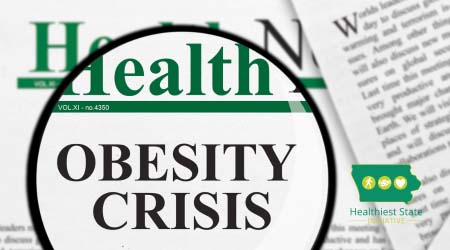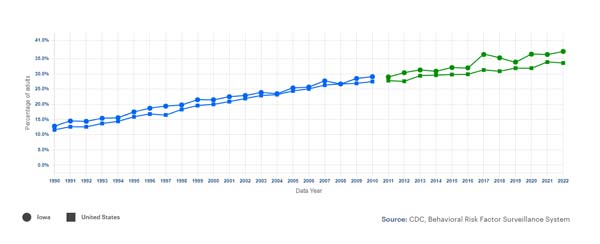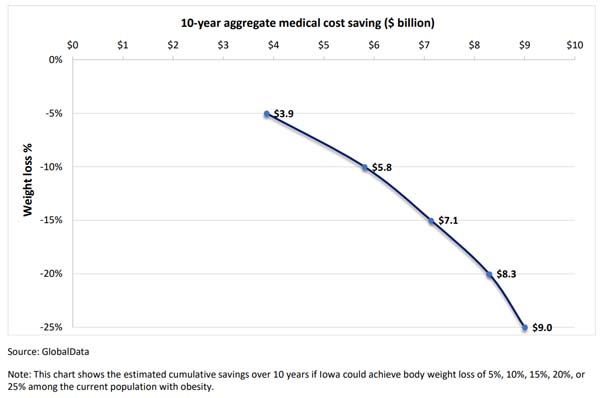Understanding the Impact of Obesity on the Workplace
Iowa is in the midst of an obesity crisis that is not only heavily impacting those living with the chronic disease, but causing more than $1 billion in higher healthcare, absenteeism and disability costs to employers, according to a new study by Global Data PLC. Considering the staggering costs of obesity and overweight on workplaces across the state, it is time for businesses to step up to support the wellbeing of their employees.

Iowa currently ranks 11th in the country for adult obesity rates according to the Iowa Department of Health and Human Services. This lands Iowa in a group of 19 states with an obesity prevalence rate at or over 35%. The exact rate of obesity varies based on the source, but it can get as high as 47.6% according to a study from NORC, a social research group based at the University of Chicago.
A person is considered overweight when their body mass index (BMI) is at or greater than 25 and considered obese at or greater than 30 according to the World Health Organization.
When expanding the scope to include both overweight and obese Iowans the numbers are even more concerning. 70% of adults in Iowa are considered to live with obesity or are overweight.
The impact of these figures on the long-term health of the Iowans facing obesity cannot be understated. Being overweight or obese exposes a person to an increased risk of developing several diseases including heart disease, diabetes and several types of cancers. It also impacts every aspect of health daily including respiratory and reproductive function, memory and mood. Notably, obese children are also more likely to become obese adults and are more likely to suffer from high blood pressure, bone and joint problems, depression and suffer from bullying.
Obesity is a chronic disease, and it carries significant adverse effects both in the short term, and the long term, so what does this mean for Iowa’s workforce and economy?
According to Global Data’s study ‘Obesity’s Impact on Iowa’s Economy and Workforce in 2022,’ Iowa saw an estimated $5.7 billion reduction in economic activity because of obesity alone — $619 million of that from high healthcare costs to employers, and $415 million in health-related lost workdays and disability. Obesity silently costs employers over $1 billion, or a 2.5% reduction in Iowa’s Gross Domestic Product.
Obesity’s impact on the labor force manifests in other ways including reduced labor force participation and obesity attributed early mortality. In 2022 alone, 31,400 fewer adults worked because of the effects of obesity, and 5,500 premature deaths occur annually because of the disease. Iowans are missing more days of work, incurring considerably larger health care costs and exiting the workforce sooner than their coworkers of a ‘healthy’ weight.
Finally, the impact stigma can have on those suffering from obesity is also worth mention. People with obesity often face stigma, bias and discrimination in various areas of life, including education, employment, healthcare and interpersonal relationships. This can result in reduced self-confidence and limited opportunities for social and professional advancement.
“Research unequivocally demonstrates the significant economic toll of obesity, with higher medical costs, increased disability and workers' compensation expenses, and diminished productivity. Our estimate, at nearly $6,500 annually per employee with obesity, underscores the urgency of addressing this issue. Moreover, untreated obesity not only impacts financial bottom lines for employers in Iowa but also diminishes quality of life and elevates mortality rates for Iowans. Failing to address obesity means perpetuating these burdens for both employers and employees alike.” - Tim Dall, Executive Director, Life Sciences at GlobalData PLC
It’s clear the trajectory Iowa is on is not working for the long-term health of its citizens or the financial well-being of the businesses that employ them, especially when considering historical trends. Iowa’s obesity rate in 2022 was 37.4%, up from 29% a decade prior and up from 22% in 2002, according to the CDC.

When the crisis is as widespread as it currently is in our state, even small positive progress can have a massive impact. GlobalData estimates that 5%-25% weight loss in adults younger than 65 over the next 10 years has the potential to save $3.9-$9 billion dollars in medical costs annually.

To move forward, and successfully tackle the obesity crisis, will require multiple sectors to act, but workplaces have a key role to play in supporting their employees that live with obesity.
In their report, GlobalData suggests three key ways workplaces can better support their employees living with obesity: 1) Offer insurance coverage and wellness programs for obesity care, 2) foster a culture of support and inclusion and 3) provide education and resources.
-
Employers can ensure their health insurance plans cover evidence-based obesity treatments, including intensive behavioral counseling, nutrition support, pharmacotherapy and bariatric surgery. Employers can implement wellness programs that specifically address obesity prevention and management. These programs can include resources for healthy eating, physical activity initiatives, access to fitness facilities or classes and weight management support.
-
Employers can create a culture of support and inclusion that recognizes and accommodates the needs of employees with obesity. This can involve implementing non-discriminatory policies, offering weight bias and stigma training, creating a supportive workplace environment that promotes healthy behaviors such as providing healthy food options, offering opportunities for physical activity and providing reasonable workplace accommodations for individuals with obesity and related health conditions.
-
Employers can provide education and resources to employees about the health risks associated with obesity and strategies for obesity care and weight management. This can include partnering with their health insurance program and other providers to encourage weight assessments as part of their annual physical, and offer health screenings, health coaching and other support services.
Specific resources to carry out these suggestions are everywhere. The Iowa Healthiest State Initiative’s 5-2-1-0 Healthy Choices Count! program offers an evidence-based framework complete with workplace resources for employers to utilize in support of their workers. Our Workplace Well-being Conference on Wednesday, April 17 is also a fantastic event to attend to learn more about best practices to support the physical, social and mental health of employees.
Finally, the CDC offers the Workplace Health Resource Center, where employers can find actionable, sound information, vetted by the CDC and experts to help launch or improve workplace health programs.
Iowa’s struggle with the obesity crisis affects those suffering from the disease, and our state’s economy more than many people know. By being informed of the impact and risks, however, we can address the issue head-on and make a healthier Iowa to reverse our current trends.
Because of the impact they have on the lives of their employees, workplaces are poised to have a massive impact on the fight against obesity in the state. Through purposeful cultural and organizational change, workplaces can provide their employees with the tools they need to live their healthiest life and not only create a healthier and happier workforce but support their business interests as well.
Iowans looking to learn more about the current state of obesity, the findings of Global Data’s report and ways to further support their employees and fellow Iowans are invited to attend the Iowa Healthiest State Initiative ‘Economic Impact of Obesity on Employers’ webinar presented by Lilly on Friday, April 5, where Tim Dall with Global Data will expand the conversation around the report.
The Greater Des Moines Partnership calendar of events is a one-stop resource for activities taking place throughout the region. Find networking information for Greater Des Moines (DSM) businesses, including Chamber luncheons, roundtables and ribbon cuttings. You can also find live music happening each week thanks to the "Live Music This Week in DSM” blog series.